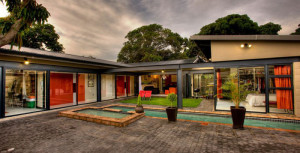 Kenya has long been known as one of the leading business and investment centres in east Africa. Kenya’s strategic location in East Africa has attracted many companies which are looking to expand in the East Africa region and consider Kenya as a market entry point into the larger East African markets.
Kenya has long been known as one of the leading business and investment centres in east Africa. Kenya’s strategic location in East Africa has attracted many companies which are looking to expand in the East Africa region and consider Kenya as a market entry point into the larger East African markets.
Residential sector
The growth in Kenya’s middle class has led to an increase in demand for residential real estate, and the speed of urban population growth currently exceeds the rate of development of new houses. Kenya’s state-run National Housing Corporation estimates the current housing shortage at 2 million units. Current production of new houses is estimated at 30 000 units per year.
Kenya’s government is currently looking to the private sector to address the housing deficit and in 2012, the government introduced new regulations to allow PPPs to be used to develop new housing projects. Three PPP housing projects for public servants totalling 76 000 units are currently in the development pipeline. In the private residential market, urban developers in Kenya are currently adopting a ‘high density’ approach to scheme design – such as apartments – and a bigger plot ratio in order to make optimal use of available land.
The National Housing Corporation estimates the current housing shortage at 2 million units. Current production of new houses is estimated at 30 000 units per year.
Retail sector
The outlook for the retail sector is strong and Kenya is starting to be seen as an ideal point of entry for launching retail outlets and consumer goods distribution into East and Central Africa. The improved infrastructure facilitates the movement of goods and means a wider variety is available at lower prices. Kenya has a growing local market with a consumer base whose wealth is increasing. Only about 16.8% of the population currently falls into the middle class, but this is growing fast.
Kenya’s ‘Vision 2030’ includes plans to improve the efficiency of the retail market and further increase potential investment opportunities. Malls are already surpassing office space in profitability.
Foreigners seeking a foothold in the market have to be concerned about several barriers. Regional trade policies also work against foreign retailers that seek to rely on imports. Preferential tariffs on goods coming from the
Common Market for Eastern and Southern Africa or the East African Community, as well as government protection of local producers of red meat, dairy products and eggs, mean that imported food products from further afield often struggle to be competitive.
Commercial sector
Kenya’s office sector is becoming saturated. It is expected that office supply will exceed demand by 2016. The current average rent for office space is approximately US$20/m2 per month. This rental may begin to fall as property owners begin to compete for tenants.
While the Real Estate Investment Trust (REIT) structure was introduced in Kenya in 2013, there are currently no active REITs in the Kenyan market. A number of industry players are in the process of seeking approval from the Capital Markets Authority (CMA) for the purpose of listing REITs. The CMA has approved and licensed five REIT Managers; Stanlib Kenya Limited, Fusion Investment Management Limited , CIC Asset Management Limited, Centum Asset Managers Limited and UAP Investments Limited.















